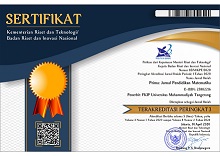EFFECTIVENESS OF LEARNING MODEL QUANTUM LEARNING AGAINST STUDENTS’ MMATHEMATICAL CRITICAL THINKING SKILLS
Abstract
Keywords
Full Text:
PDFReferences
Anggara , A., & Rakimahwati. (2021). The Effect of Quantum Learning Model on Student Learning Activities and Outcomes in Thematic Learning in Elementary Schools. Basicedu Journal , 5 (5), 3020-3026.
Annisa, Patta, R., & Pagarra, H. (2024). The Effect of the Application of Quantum Learning Learning Models on Student Critical Thinking Ability in Mathematics Subjects Class V SD Negeri Maccani 2 Makassar City. Pendas: Basic Education Scientific Journal , 09 (1), 51-56.
Ariadila, S. N., Silalahi, Y. F. N., Fadiyah, F. H., Jamaludin, U., & Setiawan, S. (2023). Analysis The importance of critical thinking skills in learning for students. Scientific Journal of Educational Vehicles , 9 (20), 664-669.
Hasibuan, K., Lubis, M. S., & Afri, L. D. (2023). Differences in the reciprocal teaching and LSQ models on mathematical problem solving capabilities. Relevant: Journal of Mathematics Education , 3 (1), 23-31.
Lubis, M. S. (2024). Analysis of difficulty understanding mathematical concepts in terms of students' metacognition abilities in class X students of SMA Negeri 1 Sibolga. Farabi Journal of Mathematics and Mathematics Education , 7 (1), 1-8. https://doi.org/10.55340/japm.v6i2,270
Lubis, N. A., & Rahmadhani, E. (2023). Analysis of the ability to understand student concepts on linear program material. Axiom: Journal of Education and Mathematics , 12 (2), 226-240.
Maruti, E. S., & Anggraini, E. D. (2022). Application of Quantum Learning Learning Model for Falsh Card Card Javanese Material in Elementary Students. Journal of Education and Development Institute , 10 (1), 213-216.
Maysarah, S., Armanto, D., & Saragih, S. (2024). Analysis of numeracy literacy skills in elementary schools. Indomath: Indonesia Mathematics Education , 13 (1), 52–64. https://doi.org/10.30738/indomath.v7i1.81
Narpila, S. D., Aufa, A., & Hasanah, U. (2023). Training on the preparation of RPP Based on Merdeka Curriculum at SMP Istana Hati Binjai. Journal of Progressive Humanist Community Service Brainstorming , 6 (4), 1042–1050. https://doi.org/10.30591/japhb.v6i4.5150
Narpila, S. D., Pitaloka, D. D., Ramadhan, R., & Muttaqin, A. (2025). Comparison of Conventional Learning Activities and Technology -Based Learning on Student Learning Outcomes (Case Study in CLS VIII A SMP Smart Bangsa, Namorambe District, Deli Serdang Regency). Journal of Nakula: Center for Education, Language and Social Sciences , 3 (1), 210-2025.
Nasution, M., Neliwati, & Rakhmawati, F. (2022). The Effect of Application of Contextual Teaching and Learning Learning Models on Student Critical Thinking Ability. Relevant: Journal of Mathematics Education , 2 (1), 93-97.
NCTM. (2020). Principles and Standards FOS School Mathematics . NCTM.
Nurjannah, A., & Arifin, F. (2023). The application of Quantum Learning in an effort to increase Mathematical critical thinking skills in Kepas II Elementary School. Elementary: Journal of Basic Education , 3 (1), 79-85. https://doi.org/10.15408/elementar.v3i1.22297
Pulungan, A. R., & Rakhmawati, F. (2022). Mathematics learning media trends in mathematics education journals throughout Indonesia. Journal of Scholar: Journal of Mathematics Education , 6 (3), 3443-3458. https://doi.org/10.31004/cendekia.v6i3.1776
Salim. (2018). Quantitative Research Methodology . Citapustaka Media.
Saputro, T. (2024). The Effect of Quantum Learning Learning Model on Critical Thinking Ability of Students Class XI SMAN Bandar Lampung. Biiochephy: Journal of Science Education , 4 (2), 1037–1043. https://doi.org/10.52562/biochephy.v4i2.1390
Siregar, M. A. P., Ammamiarihta, A., & Rohimah, N. (2023). Development of Smart Board Learning Media in Mathematics Learning Based on Drill and Practice. Axiom: Journal of Education and Mathematics , 12 (1), 106–119. https://doi.org/10.30821/Axiom.V12I1.15117
Siregar, T. J., Br Ginting, S. S., & Nasution, H. A. G. (2024). Development of Teaching Materials Subjects Geometry Transformation Based on North Sumatra Culture. Theorem: Theory and Mathematical Research , 9 (2), 233-246. https://doi.org/10.25157/teorema.v9i2.15644
Sudijono, A. (2018). Introduction to Educational Statistics . Rajawali Press.
Trinova, Z., Nelwati, S., Khairo, N., Islam, U., Imam, N., & Padang, B. (2022). Quantum Learning Model in Improving Student Critical Thinking Ability. E-Journal Tarbiyah Al-Awlad , xii (1), 20-33.
Wardani, D. K., Sakdiyah, S. H., Kumala, F. N., Indawati, N., Malang, K., & Malang, K. (2024). The influence of critical thinking skills on the ability to solve elementary school student learning problems in IPAS learning at SDN Gunungsari. KURAIR Journal of Technology, Information and Industry , 7 (October), 45-59.
Zakiah, L., & Lestari, I. (2019). Thinking Kritias in the context of learning. In Erminawati (ed.), Sustainability (Switzerland) (Mold I, Vol. 11, Issue 1). Erzatama Karya Abadi.
DOI: http://dx.doi.org/10.31000/prima.v9i3.14636
Article Metrics
Abstract - 905 PDF - 329Refbacks
- There are currently no refbacks.
Prima: Jurnal Pendidikan Matematika
Program Studi Pendidikan Matematika
Fakultas Keguruan dan Ilmu Pendidikan
Universitas Muhammadiyah Tangerang
Jl. Perintis Kemerdekaan I/33, Cikokol
Kota Tangerang, Indonesia
e-mail: primajpm@gmail.com
Prima: Jurnal Pendidikan Matematika (p-ISSN: 2579-9827 | e-ISSN: 2580-2216) is licensed under a Creative Commons Attribution 4.0 International License.







